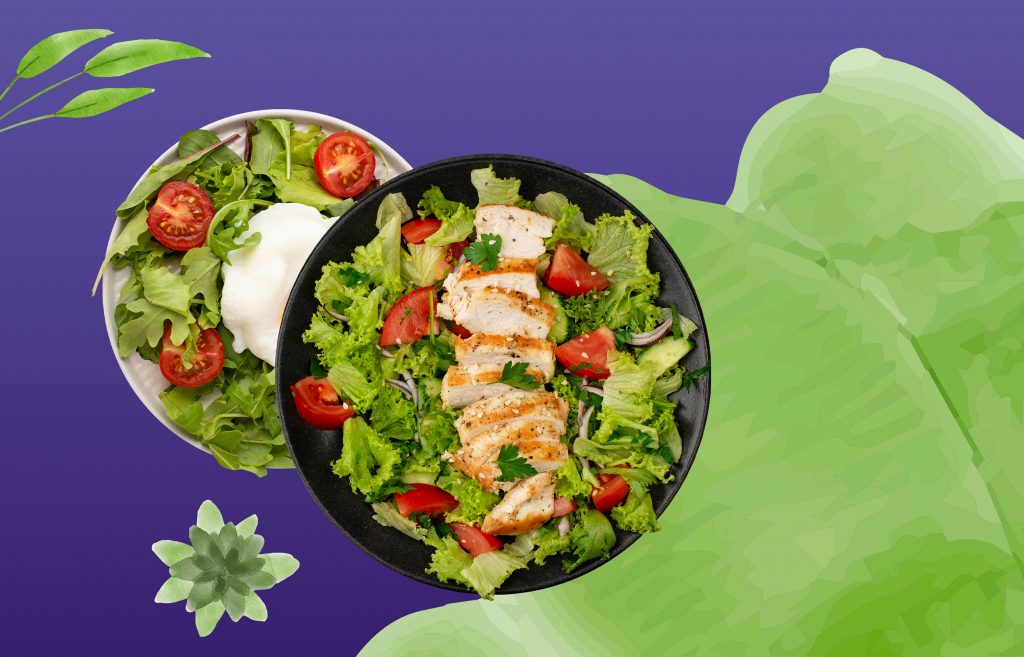
Building muscle goes beyond lifting weights and following a tough workout regime; it’s heavily influenced by what you eat. Nutrition is the foundation of muscle growth, aiding muscle repair, fueling workouts, and ensuring long-term gains. Many people believe that bulking up means simply loading up on protein, but that’s just one piece of the puzzle. Understanding the right mix of macronutrients, meal timing, and specific food choices is essential to making steady muscle gains. So, what should you eat to build muscle? Let’s dive into the nutritional roadmap for effective muscle building.

Understanding the Basics of Muscle Growth
How Muscles Grow: The Science Behind Hypertrophy
Muscle growth, scientifically known as hypertrophy, is the process where muscle fibers increase in size in response to stress from weightlifting or resistance training. When you exercise, small tears occur in muscle fibers. After your workout, these fibers repair and grow back stronger with the help of nutrients, mainly protein. This repair process is what leads to muscle growth. Proper nutrition supplies the fuel and building blocks needed for this repair, making it crucial to consume a diet that supports these processes.
Key Nutritional Components for Muscle Building
To build muscle, you need a balanced intake of essential nutrients. Protein is key, as it provides amino acids that form muscle tissue. Carbohydrates offer energy and replenish glycogen stores, while healthy fats support hormone production, especially testosterone, which is vital for muscle growth. Additionally, vitamins and minerals play supportive roles in muscle contraction, energy production, and recovery.
The Role of Protein in Muscle Building
How Much Protein Do You Need?
Protein intake is crucial for muscle repair and growth. To build muscle effectively, aim for around 1.6 to 2.2 grams of protein per kilogram of body weight daily. For example, if you weigh 70 kg (about 154 lbs), you’ll need between 112 and 154 grams of protein per day. Athletes or those doing intense training may need slightly more. Keep in mind that age, gender, and individual goals can influence precise protein requirements.
Best Sources of Protein for Muscle Growth
There are a variety of high-quality protein sources suitable for muscle building:
- Animal-Based Proteins: Lean meats like chicken breast, turkey, lean beef, and fish offer high protein with minimal fat, which is ideal for muscle gain. Eggs are also excellent, offering a complete amino acid profile.
- Plant-Based Proteins: For those on a plant-based diet, foods like lentils, beans, quinoa, and tofu are protein-rich and can support muscle growth. Plant-based proteins are often lower in specific amino acids, so varying sources is essential.
- Protein Powders and Supplements: Whey and casein protein powders are convenient for those needing quick protein post-workout. Vegan protein powders (like pea or soy protein) are also effective for muscle growth when whole food sources are limited.
Carbohydrates: Fueling Your Workouts and Recovery
Carbohydrate Needs for Muscle Gain
Carbohydrates are vital for providing energy during workouts and replenishing muscle glycogen, which is the stored form of glucose in muscles. Aim to consume 3-7 grams of carbs per kilogram of body weight daily, depending on activity level. Carbs prevent fatigue during intense workouts and aid recovery, allowing you to train harder and more consistently.
Best Carbohydrate Sources for Muscle Building
Choosing the right carbs is essential:
- Complex Carbs: Whole grains like oats, brown rice, quinoa, and sweet potatoes provide sustained energy and keep blood sugar levels stable.
- Simple Carbs: Fruits and some vegetables offer quick-release carbs, ideal for a quick boost before or after workouts.

Fats: Supporting Hormone Production and Recovery
Why Fats Are Important for Muscle Growth
While fats don’t directly contribute to muscle synthesis, they play an indirect yet crucial role. Fats support hormone production, including testosterone, which is essential for muscle growth. Consuming around 20-35% of your total daily calories from healthy fats is recommended for those looking to build muscle without compromising overall health.
Best Sources of Healthy Fats
The types of fats you consume make a difference:
- Omega-3 Fatty Acids: Foods like salmon, chia seeds, and flaxseeds are rich in omega-3s, which help reduce inflammation and aid recovery.
- Monounsaturated Fats: Avocados, olive oil, and nuts offer heart-healthy monounsaturated fats that support hormone balance and overall well-being.
Essential Vitamins and Minerals for Muscle Growth
Vitamin D and Calcium
Vitamin D and calcium are essential for strong bones and muscle contraction. Vitamin D aids in calcium absorption, which is crucial for bone health—a foundation for effective muscle growth. Include foods like dairy, fortified plant milks, and fatty fish to ensure you’re meeting your needs.
Iron and Magnesium
Iron is crucial for transporting oxygen to muscles, while magnesium aids in muscle function and relaxation. Foods like spinach, nuts, and legumes are rich in these minerals and help support muscle performance and recovery.
Importance of Meal Timing for Muscle Building
Pre-Workout Nutrition
Eating a balanced meal or snack before your workout can improve performance. Ideally, consume a mix of carbs and a small amount of protein about 1-2 hours before exercising. For example, a banana with peanut butter or a small bowl of oatmeal with berries is great for sustained energy.
Post-Workout Nutrition
The post-workout period, often called the “anabolic window,” is prime time for muscle recovery. Aim for a meal with protein and carbs within 30 minutes to an hour after working out. A protein shake with a piece of fruit or chicken with sweet potatoes are ideal options to kickstart recovery.
Hydration and Its Impact on Muscle Performance
How Much Water Do You Need?
Hydration is key for optimal muscle function. On average, aim for at least 3 liters of water daily, adjusting for factors like exercise intensity, climate, and individual needs. Dehydration can impair muscle recovery, making it essential to keep hydration in check.
Electrolytes and Muscle Function
Electrolytes like sodium, potassium, and magnesium are critical for muscle contractions. Foods like bananas, coconut water, and leafy greens help replenish electrolytes and prevent muscle cramps.
Common Myths and Misconceptions About Muscle-Building Diets
Myth: You Need Excessive Protein to Build Muscle
While protein is essential, more is not always better. Excessive protein can strain the kidneys and may not enhance muscle gain. Balance and variety are more beneficial than overloading on one macronutrient.
Myth: Carbs Will Make You Gain Fat, Not Muscle
Carbohydrates are essential for muscle gain as they fuel workouts and aid recovery. When eaten in moderation and timed appropriately, carbs will support muscle growth rather than lead to fat gain.
Tips for Planning a Muscle-Building Meal Plan
Creating a Balanced Plate
A balanced muscle-building plate includes lean protein, complex carbs, and healthy fats. This structure provides energy, supports recovery, and sustains muscle growth while offering the body all essential nutrients.
Sample Muscle-Building Meal Plan
- Breakfast: Greek yogurt with berries and granola
- Lunch: Grilled chicken, quinoa, and mixed vegetables
- Dinner: Salmon, sweet potatoes, and sautéed spinach
- Snacks: Protein shake, nuts, and a banana
Supplements for Muscle Building: Are They Necessary?
Popular Muscle-Building Supplements
Some popular supplements include whey protein, creatine, branched-chain amino acids (BCAAs), and multivitamins. Each serves different purposes, like quick protein access or enhanced strength, but it’s best to consult a health professional before adding supplements.
Whole Foods vs. Supplements: Which Is Better?
Whole foods offer a complete range of nutrients, while supplements can help when dietary needs aren’t met. Aim to build a strong foundation with whole foods and use supplements only when necessary for convenience or specific goals.
Conclusion
Building muscle is a journey that requires the right blend of nutrition, exercise, and consistency. A balanced diet with sufficient protein, carbs, healthy fats, and key vitamins and minerals forms the basis for muscle growth. By focusing on whole foods, staying hydrated, timing meals effectively, and incorporating rest, you’re setting yourself up for successful, sustainable muscle gain.

Frequently Asked Questions (FAQs)
Can you build muscle on a plant-based diet?
Yes, with the right protein sources and meal planning, a plant-based diet can support muscle growth.
How often should I eat to build muscle?
Eating every 3-4 hours can help maintain energy levels and support consistent muscle growth.
Are protein shakes necessary for muscle gain?
Protein shakes are convenient but not necessary; whole foods can provide adequate protein.
What is the best meal to eat before bed for muscle growth?
A small serving of protein, like cottage cheese or Greek yogurt, is ideal to support overnight muscle repair.
Can I build muscle without eating meat?
Absolutely. Plant-based proteins from beans, tofu, lentils, and quinoa are excellent for muscle growth.







